▼ VVPAT for General Elections 2019 approved [04-21-17]
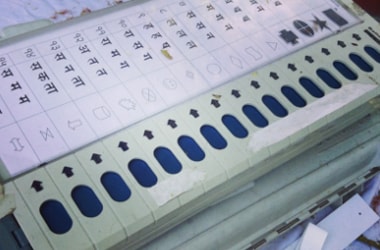 The Union Cabinet chaired by the Prime Minister Shri Narendra Modi has given its approval for procurement of Voter Verifiable Paper Audit Trail (VVPAT) Units for use in the General Elections, 2019. The Union Cabinet chaired by the Prime Minister Shri Narendra Modi has given its approval for procurement of Voter Verifiable Paper Audit Trail (VVPAT) Units for use in the General Elections, 2019.
The decision of the Government would enable the Election Commission of India to deploy VVPAT Units in all polling booths in the General Elections, 2019.
This will act as an additional layer of transparency for the satisfaction of voters, allaying any apprehension in the minds of the voters as to the fidelity and integrity of the EVMs.
VVPAT: Know More
- Voter-verifiable paper audit trail (VVPAT) or verifiable paper record (VPR) is a method of providing feedback to voters.
- It is using a ballotless voting system.
- A VVPAT is intended as an independent verification system for voting machines designed to allow voters to verify that their vote was cast correctly.
- It is used to detect possible election fraud or malfunction, and to provide a means to audit the stored electronic results.
- It contains name of the candidate (for whom vote has been casted) and symbol of the party/ individual candidate.
|
▼ President Pranab Mukherjee approves only Hindi speeches for dignitaries [04-19-17]
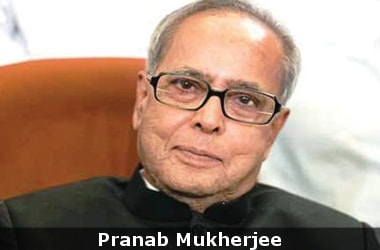 President Pranab Mukherjee has accepted the recommendations of a parliamentary committee that says speeches of dignitaries, including the President and Union Ministers, should be delivered in Hindi alone if they can. President Pranab Mukherjee has accepted the recommendations of a parliamentary committee that says speeches of dignitaries, including the President and Union Ministers, should be delivered in Hindi alone if they can.
To promote Hindi, the President has directed the Aviation Ministry to ensure that national carrier Air India have Hindi in-flight journals.
However, the president has rejected the idea of mandatory use of Hindi in all official communication of public share holding companies or forcing private companies to bring out a Hindi catalogue of their products.
He has also turned down the proposal of a minimum knowledge of Hindi as a prerequisite for a government job.
The Committee of Parliament on Official Languages made over 100 recommendations in 2011 to promote Hindi and interestingly, even then the Committee was headed by a non-Hindi speaking politician, former Home Minister P Chidambaram.
|
▼ Punjab government shuns VIP culture [04-17-17]
Punjab government has prohibited the inclusion of names of the government functionaries, including ministers and MLAs, on foundation stones and inaugural plaques.
This is to build a stronger connect with the people by shedding the VIP culture.
The state government has clarified that though there is no bar on government functionaries and leaders attending or laying the foundation stone of any project, the practice of inscribing their names on foundation stones or plaques would be discarded with immediate effect.
Further, the order has clarified that henceforth all projects and programmes, including those inaugurated by the CM, would be “dedicated to the people of Punjab”.
The order comes at the backdrop of cabinet minister Sadhu Singh Dharamsot threatening a government school principal over his name not being at the top of the inauguration plaque went viral on social media.
The chief minister of Punjab has been seen taking various initiatives to shed VIP culture in the state.
Singh and his cabinet ministers gave up the symbolic red beacon light on their vehicles, fulfilling a promise on the party’s election manifesto.
Punjab Government: Know More - Seat of Government : Chandigarh
- Governor: Vijayendrapal Singh
- Chief Minister: Amarinder Singh
- LegislatureAssembly: Punjab Vidhan Sabha
- Members in Assembly: 117
- Judiciary
- High Court: Punjab & Haryana High Court
- Chief Justice: Justice Shiavax Jal Vazifdar (Acting Chief Justice)
|
▼ UP govt signs MoU for 24/7 power [04-17-17]
The Uttar Pradesh government has signed an MoU with the Centre to ensure 24/7 power supply by Oct, 2018.
The surcharge waiver would cost the state exchequer around INR 3,500 crore.
Also, in a first, the UP government has decided to purchase potatoes directly from farmers to cut wastage of the crop due to shortage of cold storages.
Centre approved procurement of 1 lakh metric tonne (MT) of potatoes+ in the state under the Market Intervention Scheme (MIS) during 2016-17 crop year (July-June).
The approval is in tune with the UP cabinet's decision to procure potatoes so that the farmers are not forced to sell it at throwaway prices in summer.
The purchase will be made at Rs 4,870 per MT. The agriculture ministry will provide an additional Rs 1,217.50 per MT for overhead expenses.
This follows loan waiver for farmers and speed up wheat procurement drive at MSP in the state.
With this, Uttar Pradesh which was the only state in the country which had not signed the agreement has finally come on board the central government scheme.
The chief minister chose Ambedkar Jayanti as the occasion to sign the ambitious 24×7 Power For All scheme of the Centre, as he said it was a tribute to Ambedkar, who stood for equality for all, irrespective of caste.
|
▼ UP govt to ensure 24x7 power supply by 2018 [04-12-17]
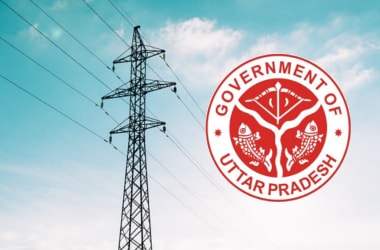 Taking its second biggest decision since coming to power, the Uttar Pradesh government on April 11, 2017 decided to waive surcharge on electricity dues. Taking its second biggest decision since coming to power, the Uttar Pradesh government on April 11, 2017 decided to waive surcharge on electricity dues.
It also gave nod to an agreement with the Centre to ensure 24X7 power supply by October 2018.
The MoU between UP and the Centre would be signed in the presence of Yogi and Union power minister Piyush Goyal.
The surcharge waiver would cost the state exchequer around INR 3,500 crore.
Also, in a first, the UP government has decided to purchase potatoes directly from farmers to cut wastage of the crop due to shortage of cold storages.
Coming in support of the UP government, the Centre approved procurement of 1 lakh metric tonne (MT) of potatoes in the state under the Market Intervention Scheme (MIS) during 2016-17 crop year (July-June).
The approval is in tune with the UP cabinet's decision to procure potatoes so that the farmers are not forced to sell it at throwaway prices in summer.
The purchase will be made at Rs 4,870 per MT. The agriculture ministry will provide an additional Rs 1,217.50 per MT for overhead expenses.
In another decision, the government gave nod to short-term mining policy, allowing district magistrates to give permits for mining for a limited period to plug the shortfall of sand and building material.
The permit, to be given in 10 days, will be issued through e-tendering.
Yogi Adityanath: Know More
- Born: 5 June 1972 Pauri Garhwal district
- Education: Hemwati Nandan Bahuguna Garhwal University
- Party: Bharatiya Janata Party
- Deputy: Keshav Prasad Maurya, Dinesh Sharma
|
▼ RS approves GST legislations [04-10-17]
Rajya Sabha on 6 April 2017 passed all four supporting legislations of the Goods and Services Tax Bill, GST rollout 2017.
The four bills were passed by the Rajya Sabha by a voice vote as all parties were on board.
The four legislations are:
i. The Central Goods and Services Tax Bill, 2017 (The CGST Bill).
ii. The Integrated Goods and Services Tax Bill, 2017. (The IGST Bill).
iii. The Union Territory Goods and Services Tax Bill, 2017 (The UTGST Bill).
iv. The Goods and Services Tax (Compensation to the States) Bill, 2017 (The Compensation Bill).
The passage in the upper house of the Parliament has cleared the decks for the rollout of the historic GST Bill from 1 July 2017 and usher the one-nation-one-tax regime.
With this passage in Rajya Sabha, the Bill will be sent to President Pranab Mukherjee for the final nod. The bills will become the law after the President gives his assent to them.
The Bill was earlier passed by the Lok Sabha on 29 March 2017.
Now, the States can pass the State GST Bill in their assemblies.
Parliament passed all the four bills related to GST rollout unanimously.
The agricultural produce will not be taxed under the new indirect tax regime. All those items which are exempted as of now will continue to be so.
|
▼ Jhargram: 22nd district of WB [04-6-17]
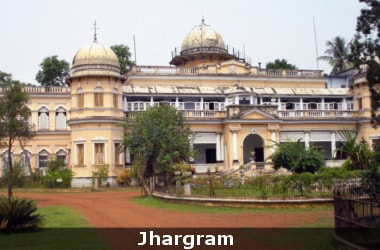 West Bengal Chief Minister Mamata Banerjee on April 4, 2017 announced Jhargram as a new district of the State. West Bengal Chief Minister Mamata Banerjee on April 4, 2017 announced Jhargram as a new district of the State.
Carved out of four Assembly seats of Paschim Medinipur district, Jhargram was once a hotbed of Maoist activity.
Lalgarh, which comes under the new district, had become a “liberated zone” after the Left Front government reclaimed the area through a joint operation with Central forces in June 2009.
Also on the anvil are a university at Jhargram, along with an archery academy, nine colleges and six hospitals.
Jhargram is the State’s 22nd district.
In February, the Mamata Banerjee government had made Kalimpong a separate district after carving it out of Darjeeling district.
In June 2014, Alipurduar, of Jalpaiguri district, became the 20th district of the State.
The State government has plans to bifurcate Bardhaman district into a rural and an industrial belt, and also make Sunderbans, spread over North 24 Parganas and South 24 Parganas, into a separate district.
According to the State government, creating new districts helps in administrative convenience and brings services closer to the people.
Jhargram: Know More
- The new district comprises eight blocks, nine police stations and one municipality.
- It has a population of around 11,37,000 and four Assembly constituencies - Jhargram, Gopiballavpur, Nayagram and Binpur.
- While R Arjun was appointed as Jhargram district magistrate, Abhishek Gupta was named the SP.
- CM announced that a budget Rs 200 crore has been sanctioned for development projects to be undertaken in the area.
- Around 35,000 people have been recruited in the police from Jangalmahal.
|
▼ NBEM constituted [04-6-17]
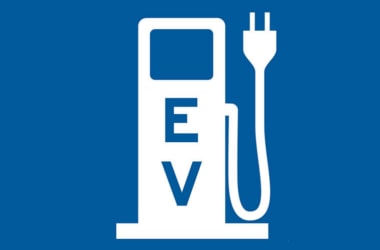 The Centre on April 3, 2017 notified the constitution of the National Board of Electric Mobility (NBEM). The Centre on April 3, 2017 notified the constitution of the National Board of Electric Mobility (NBEM).
It also nominated six members of eminence and expertise from the automobile industry into it, including Vikram Kirloskar (Toyota Kirloskar Motors), Vinod Dasari (Ashok Leyland), Pawan Goenka (Mahindra & Mahindra and Sudarshan Venu (TVS Motors).
The nominated members will have a tenure of two years or until further government order, whichever is earlier. The members can be re-nominated for additional terms, if needed.
The Board will be chaired by the Secretary, the Department of Heavy Industry.
It will comprise senior bureaucrats as members, including secretaries in the Departments of Economic Affairs, Revenue, Power, Road Transport and Highways, and Petroleum and Natural Gas.
The Cabinet chaired by former Prime Minister Manmohan Singh had on March 31, 2011, cleared the proposal for the launch of NBEM and the National Council for Electric Mobility (NCEM).
The NBEM will examine, formulate and propose short- as well as long-term plans and contours of the mission programme on electric mobility, its objectives, quantifiable outcomes and roles and responsibilities of the various stakeholders.
It will propose and recommend policy guidelines and government interventions and possible strategies for promoting electric mobility and for encouraging manufacture of electric vehicles in the country.
One of its key functions will be to explore and recommend collaborations and tie-ups for technology acquisitions, obtaining technical experts and explore possible agreements with leading R&D centres globally.
This will facilitate availability of technology to the domestic industry.
The Board will coordinate and resolve difference of opinion, if any, among Ministries.
It will examine, recommend, monitor and review electric mobility-related R&D projects and pilot projects and also evaluate and propose business models for popularising electric mobility.
It will also formulate strategies and give directions to the various ministries and other stakeholders for implementing the decisions of NCEM.
The Board may, as deemed fit, also constitute sub-committees for looking into various specific aspects, the notification added.
|
▼ Cow slaughter punishable by jail term in Gujarat [04-3-17]
Gujarat has adopted the toughest law against cow slaughter in the country. From now, the crime will be punishable with a 14-year jail term.
The state government cleared on 31st March 2017 the Gujarat Animal Preservation (Amendment) Bill, 2017.
This raises the maximum jail sentence from the current 3-7 years to 14 years for cow slaughter.
It also carries a provision of fine of up to INR 5 lakh and not less than INR 1 lakh.
The bill was passed by a majority vote in the absence of opposition members in the assembly.
This is the harshest law in the country, which was required to save our religion, culture, economy and environment, the state government held.
The bill, seen as an attempt to consolidate Hindu votes ahead of the 2017 assembly polls, makes all offences under the act cognisable and non-bailable.
Initially, the draft bill submitted in the assembly had a provision of a maximum of 10 years of jail for cow slaughter.
However, the penalty was raised to 14 years through a supplementary provision introduced in the House by the MoS home on March 31, which was attached with the amendment bill.
The jail term for illegal ferrying of cows for slaughter, selling, stocking or exhibition of cow beef, too, has been raised to 10 years.
|
| Chronology of events |
|
Prime Minister Narendra Modi has inaugurated the 10.89 km long Chenani-Nashri all-weather road tunnel on the Jammu-Srinagar National Highway.
|
|
The Union Cabinet on 31 March 2017 gave its approval for signing of an agreement between the Ministry of Rural Development and Centre on Integrated Rural Development for Asia and the Pacific (CIRDAP).
|
|
The Union Government has reduced the number of centrally sponsored schemes (CSS) from 66 to 28 umbrella schemes, effective from the financial year 2016-17.
|
|
The Union Cabinet chaired by the Prime Minister Shri Narendra Modi has approved the implementation of Supreme Court’s Judgment dated 27th October 2015 regarding Target Plus Scheme (TPS) 2004-09 in Civil Application No. 554 of 2006.The revenue implication under the TPS arising from the Hon’ble Supreme Curt’s Judgment is about INR. 2700 crore.
|
|
The Union Cabinet chaired by the PM Shri Narendra Modi has approved signing of Framework of Understanding (FoU) on Cooperation in the Hydrocarbon Sector with Bangladesh
|
|
The Union Cabinet has approved the proposal of the Ministry of Power for Signing of "Memorandum of Understanding for Establishment of the BIMSTEC Grid Interconnection". It will be signed among member states of BIMSTEC at the upcoming 3rd BIMSTEC Energy Ministers' Meeting to be held in Nepal shortly.
|
|
President Pranab Mukherjee has given assent to four supporting legislations on Goods and Services Tax (GST). The four legislations are: The Central GST Act, 2017, The Integrated GST Act, 2017, The GST (Compensation to States) Act, 2017, and The Union Territory GST Act, 2017.
|
|
Cab safety measures for women commuters as recommended by the Ministry of Women and Child Development to the Ministry of Road Transport and Highways and Shipping (MoRTH) have been included in the new Taxi Policy guidelines.
|
|
SC has taken cognisance of the increasing role of women in crime and said that gender cannot be considered as a ground for lenient punishment and they should be treated at par with men for equal offences committed by them.
|
|
SC asks the Centre, Punjab and Haryana to complete their talks on construction of SYL (Sutlej-Yamuna Link) Canal as soon as possible. Justice Ghose will retire on May 27 and said if the issue isn’t settled till then, it will have to be passed to a Bench.
|
|
Maharashtra will be the first state to launch a special awareness drive to ensure that transgenders in the state register as voters in greater numbers.
|
|
The Telangana legislature has passed the Telangana Backward Classes, Scheduled Castes, Scheduled Tribes (Reservation of Seats in Educational Institutions and of Appointments or Posts in the Services under the State) Bill, 2017.
|
|
Union government’s decision of barring the use of red beacon atop VVIP cars including the ones belonging to the President of India announced.
|
|
The Government of India has extended the ceasefire with two Naga armed groups, National Socialist Council of Nagaland-Reformation (NSCN-R) and National Socialist Council of Nagaland-Neakpao-Kithovi (GPRN/NSCN) till April 27, 2018.
|
|
P Nadda, Union Minister of Health and Family Welfare, on 19 April 2017 announced the finalisation of India’s comprehensive and multi-sectoral National Action Plan.
|